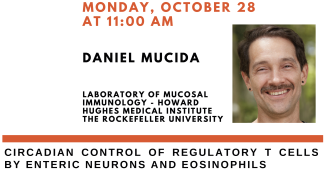Speaker : Daniel MUCIDA, laboratory of mucosal immunology - howard hughes medical institute the rockefeller university.
"Circadian control of regulatory t cells by enteric neurons and eosinophils"

Multiple intestinal functions including nutrient absorption and peristalsis display regional specialization as well as time-of-day effect under the control of circadian rhythm. We investigated the role of these adaptations in the intestinal immune system and the response to dietary antigens. We found that regulatory T (Treg) cells in the murine proximal small intestine (duodenum) expand during the active phase (night) and contract during the day. Treg cell expansion was supported by activ in A receptor-expressing eosinophils and clock gene-dependent rhythmic production of follistatin by duodenal enteric neurons. The circadian entrainment of these changes depended on light exposure but not on the time of food intake. This neuro-immune pathway affected immune responses to food, so that oral challenges during the night resulted in more protective tolerance, which was dependent on enteric neuron-derived follistatin secretion. These data suggest that circadian and regional adaptations in the intestine augment regulatory responses during the active phase.
Hosted by Dafni HADJIECONOMOU.
If you would like to meet the speaker, please contact us.
Lieu de la conférence
Please join the conference in Paris Brain Institute auditorium Edmond et Lily Safra.
